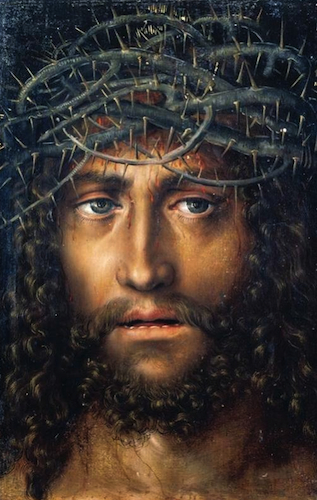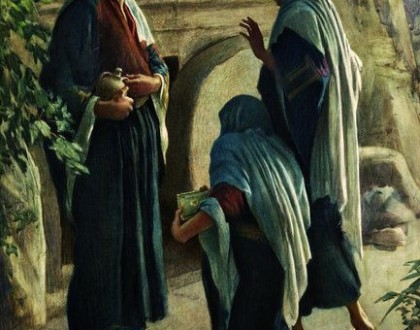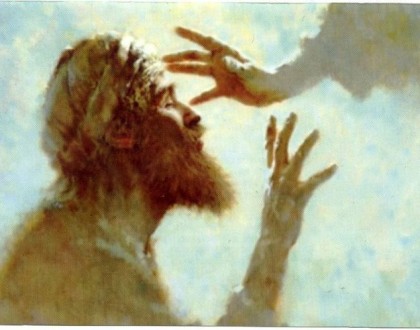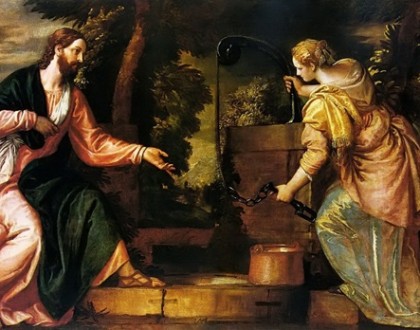The Feast of Christ the King 23, November 2014.

The Feast of Christ the King 23, November 2014.
We come to the end of the liturgical year with the feast of Christ the King. In a world where democracy holds sway and where we are skeptical of kings, it’s not an easy celebration to understand. If someone today claims to be a King we get kind of nervous, especially in the political scene. The entire political system here in the West is set up to exclude the possibility of kings having temporal power.
Kingship might be alien to us but it’s a very central biblical idea. Once you understand it on biblical terms, it can become a very illuminating and liberating theme.
In the book of Genesis, as creation unfolds, at the very end come human beings, and like in a liturgical procession the most important arrives right at the end. So at the end of the great procession of creation comes the creation of Adam and Eve.
Adam is supposed to be the King of creation, reigning as a kind of viceroy of God. Adam is made in the image and likeness of God. He bears the imprint of God and his purpose is to govern the world according to God’s purposes. Which means the purposes of love, compassion, non-violence and justice. That is Adam’s role but also the role of all human beings. Adam wasn’t a great king though, sin is bad Kingship. He allowed himself to be duped by the serpent. He wants to govern the world according to his own desires and not the purposes of God. Bad Kingship leads to trouble across the board. When the King goes bad the whole country goes bad.
Look at the History of Salvation; God continually establishes Kings in Israel, go all the way back to Abraham, Isaac, Joseph, Moses, Joshua, Samuel, Saul and then of course the great King David.
What is God doing? He is not just establishing an ever-improving political order. It’s much deeper than that. He is setting up a human figure who would be a steward of his creation.
You can see it clearly in the David story, as David slowly establishes a kind of Israelite empire. Reaching out to other nations, bringing in their wealth etc. It’s the idea of the King of Israel becoming King of the world. Notice that David at his best is always ruling according to God’s purposes, listening to God, abiding by God’s will.
David is also a fallen figure, like with the story with Bathsheba. David is also a tragic and compromised figure and even more so his son Solomon. Very quickly after the wisdom of the construction of the temple, he becomes dysfunctional and divided. Then we see in both the North and the South a string of really bad kings.
The idea is, God wants to rule through his earthly Viceroy’s, but they are bad Kings, imitating Adam in his sin.
In the wake of this we hear in the prophets and the psalms, a longing. They long for a new David, a human figure but through whom God would rule his creation.
Often the longing is for God to be King, “Lord how long…”, but his Kingship will be exercised through a Davidic figure. Therefore you have the dream of Genesis realized.
In the light of this background we now look at Jesus. He a prophet, He is a high priest but he is also very clearly presented as a King. A King who is simultaneously the Davidic King, a human figure but also as God ruling his creation.
In the Gospel of Luke, we see a rivalry presented between Caesar Augustus, the King of the whole world and this new baby who in fact is the true king of the world. You see a tale of 2 Kings; Caesar who rules through power, violence, opposed by a baby wrapped in swaddling clothes, lying in a manger, helpless. Watch this little baby King come of age. It shows us what God’s Kingship looks like. First of all the 12 apostles symbolize the gathered 12 tribes. One of roles of Kingship was to bring the nation together.
Jesus goes out to the margins, to the man born blind, to Zacchaeus, the woman at the well. Jesus’ open table fellowship draws in saints and sinners. All are welcome at the table of the Lord.
Look at his gesture of forgiveness, its not just Jesus being a nice fellow. It’s Jesus as King, drawing in all those who had been alienated from the life of Israel.
Jesus takes on the embedded powers of the world; the Scribes, Pharisees, the Temple establishment, the secular military leadership of his time… those who rule through violence and oppression, Jesus calls them out, opposes them.
Behind the human dysfunction Jesus sees a spiritual Kingship and he calls out that power too. Jesus does battle also with the demons. “I have seen Satan falling like lightening from the sky” Luke 10:18. He shows us that, behind all the human dysfunction and corruption is an even deeper spiritual corruption.
Jesus’ ministry is a Kingly ministry, it’s a warriors ministry. He fights non-violently, with the power of his word.
It all comes to a climax at the end of his life with Jesus taking on the dark powers in all their forms. Spiritual, material, political, economic, they hunt him down and nail him to a cross. It appears as though this is just one more failed King, Once more the powers of worldly corruption reign. Then Jesus in the power of the Spirit rises from the dead, showing forth that God’s power is greater than anything that’s in the world and that Jesus is now the true King.
How ironic that Pontius Pilate places over the cross, (the instrument of torture by which the wordily Kingship does its worst), a sign “Jesus of Nazareth, King of the Jews”. He announces to the whole world that a new King has arrived. The old powers of the world have been eclipsed and a New King has come.
St Paul who had understood all these Old Testament texts, this was his message; he saw Jesus risen from the dead as the New King, and hence he said over and over again, “Jesus is the Lord”, he is the King of the world and now he is the one to whom your allegiance is due. It’s under his headship that you ought to arrange your own life. That is the still revolutionary message of the Gospel. Which still makes the powers of the world tremble.
Recent Sermons

Easter Sunday – The Resurrection
April 14, 2017

4th Sunday of Lent Year A – The Man Born Blind
March 27, 2017

3rd Sunday of Lent Year A – The Samaritan Woman at the Well
March 20, 2017


